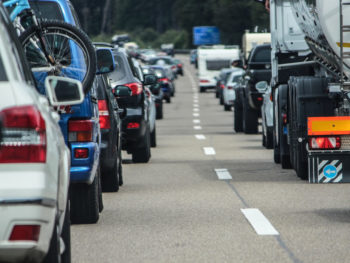Traffic reduction vital to meet net zero targets, says new report
Traffic levels on UK roads must be slashed by around a quarter by 2030 to stay on track for net zero, a new report has found.

The report calls for an urgent rethink on the UK’s transport decarbonisation strategy – in particular, a significant reduction in vehicle miles driven
Published by Greener Transport Solutions – a not-for-profit organisation dedicated to the decarbonisation of transport – the report says that switching to cleaner vehicle technologies will not be enough on its own to tackle the climate crisis. Instead, it calls for an urgent rethink on the UK’s transport decarbonisation strategy – in particular, a significant reduction in vehicle miles driven.
It echoes similar calls, including from the Mayor of London who said at the start of 2022 that achieving net zero by 2030 would need a 27% cut in car journeys – since then he’s asked TfL to consult on expanding the Ultra Low Emission Zone London-wide in 2023 to make the capital greener and less congested.
Meanwhile, the Scottish Government has pledged a 20% reduction, while research for the Green Alliance shows that a reduction in car mileage of 20-27% by 2030 will be needed.
Transport is the fastest-growing source of global greenhouse gas emissions and biggest polluting sector of the UK economy – it accounts for 37% of global CO2 emissions. Despite work to make vehicles more efficient, transport emissions in the UK are only 3% lower than they were in 1990, as people have driven more and switched to larger vehicles.
Limiting global warming to 1.5°C – to avoid the worst effects of climate change – critically depends on global greenhouse gas emissions (GHG) being halved by 2030.
But while they fell during the lockdowns, GHG have since bounced back. Latest figures from the International Energy Agency (IEA) show that carbon emissions rose to their highest levels in history in 2021 after the world rebounded from the Covid pandemic with a heavy reliance on fossil fuels. They are also expected to rise again this year.
While reducing car dependency is essential in terms of tackling climate change, it’s vital to tackle the cost of living crisis, Greener Transport Solutions has stated. UK fuel prices continue to hit new records. The Resolution Foundation says the dramatic increase in global oil and gas prices will push UK inflation above 8% this spring and average incomes across Britain are set to fall by 4% in the coming financial year.
Claire Haigh, founder and CEO of Greener Transport Solutions, commented: “At a time of rising geopolitical uncertainty, insecurity of supplies, and escalating fuel and gas prices, it becomes more critical than ever to design policies in a way that avoids unintended consequences and ensures a fair and just transition to net zero.
“We need a massive shift to clean technologies, but we must also reduce energy demand. Energy demand reduction supports the three key goals of energy policy: security, affordability and sustainability.
“Our climate is heating up at great speed. We have less than a decade to get on track. We cannot rely on technological solutions alone. Traffic reduction will also play a critical role.”
To access the Greener Transport Solutions report, click here.












